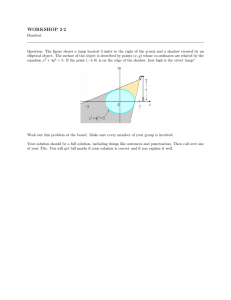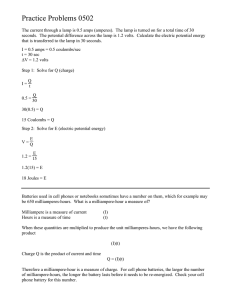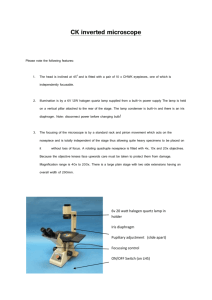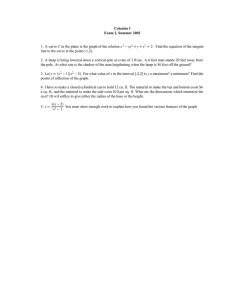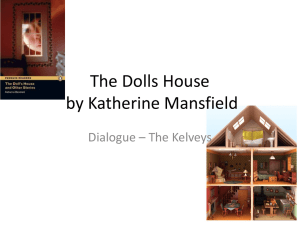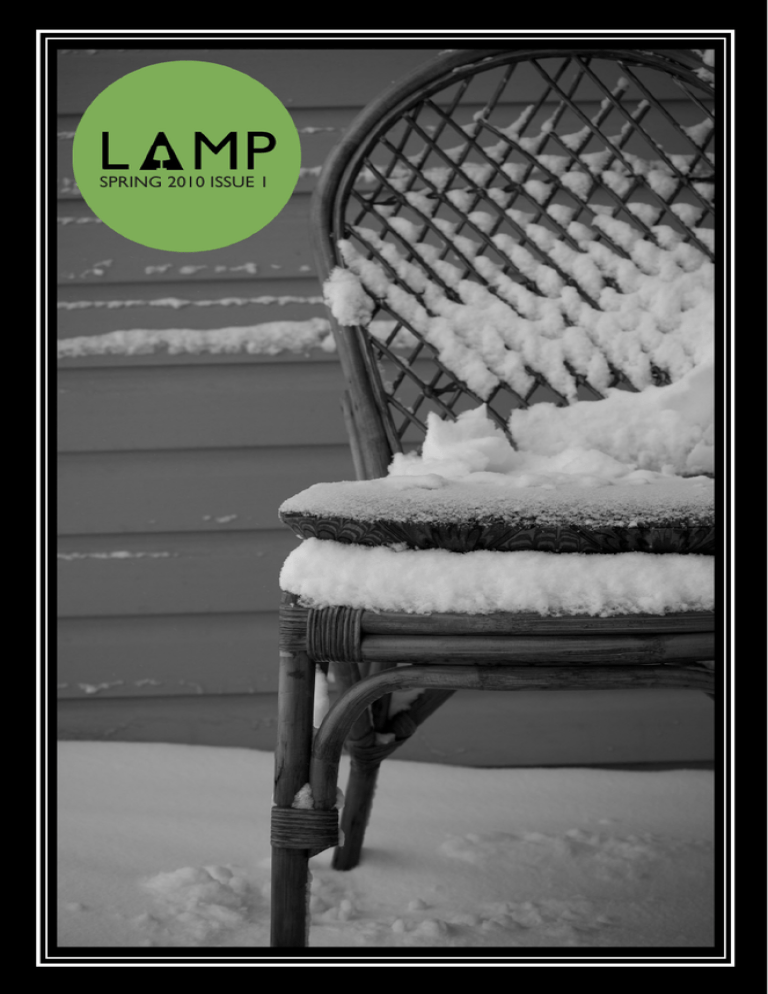
SPRING 2010 ISSUE 1
LAMP is a literary magazine which publishes creative pieces and critical essays written by current students and alumni of Liberty University; the views expressed HYL[OVZLVM[OLJVU[YPI\[VYZHUKKVUV[ULJLZZHYPS`YLÅLJ[[OVZLVM[OL3(47
staff or Liberty University. LAMP aspires to stimulate readers both within and outside the University with the creativity and critical work of its contributors.
The LAMP staff would like to thank Mr. Danny Horsley and Seckman Printing for the printing of this issue. Their generosity has helped to make this issue possible. Visit them on the web: http://www.seckmanprinting.com.
General Faculty Advisor
Graphics / Layout Faculty Advisor
Dr. Karen Swallow Prior
Professor Edward Edman
General Editor
Graphics / Layout Editor
Ryan Knight
Cara W illiams
General Editor
Nick Olson
Reader: Fiction
Mr. T. Marcus Christian
Reader: Poetry
John Gosslee
All rights reserved. No part of this publication may be reproduced without prior permission of the publisher. © 2010 Liberty University.
Letter from the
General Editor:
0U[OLÄYZ[-HSSPZZ\LVM 0^HZWSLHZLK
[VHUUV\UJL[OH[[OL3(47Z[HMM^HZÄUHSly in a position to realize one of its original goals: to print two issues per semester instead of only one.
0U [OL ZLJVUK -HSS PZZ\L 0 ^HZ WSLHZLK [V
announce that a new section called Off the Shelf would begin to appear in LAMP. Another review appears in this issue; this one concerns the late John Updike’s posthumous Endpoint and Other Poems. As one ^OV OHZ SLHYULK H NYLH[ KLHS HIV\[ SV]L
ZL_\HSP[`KLH[OHUKKV\I[MYVT[OPZTHNUPÄJLU[ ^YP[LY 0»T WSLHZLK [V ZLL HUV[OLY
^OV HSZV YLZWLJ[Z [OPZ ÄUL (TLYPJHU THU
VMSL[[LYZ3(47»ZÄYZ[TV]PLYL]PL^HSZVHWpears in this issue. I’m also pleased to introduce a new genre—
graphic narrative—into LAMP’s pages in this issue.
:VTHU`WSLHZ\YLZHUK0»TWSLHZLK[VHUUV\UJL 0 ZLL UV J\YZLZ JYLLWPUN MVY^HYK
S\UNPUNVYHU`[OPUNVM[OH[ZVY[
Ryan Knight
January 2010
Untitled
Cara Williams
LAMP
3
LAMP
Contents
3 . . . . photography . . . . .Apples
Cara W illiams
4 . . . . photography . . . . .Untitled
Chelsea Courtney
6 . . . . poetry . . . . . . . . . . .Elyse
Kristi Taylor
7 . . . . poetry . . . . . . . . . . .The Green Lady
Abigail Nusbaum
8 . . . . photography . . . . .Unititled
Chelsea Courtney
4
LAMP
9 . . . .graphic narrative . .Sebastian’s Night
Jill Johnson
14 . . .book review. . . . . . .Giving the Mundane its Beautiful Due
Andrew Walker
16 . . .photography . . . . . .The Farm
Cara W illiams
18 . . .movie review. . . . . .“This Is Not a Love Story”
Lauren Hoessley
21 . . .photography . . . . . .Untitled
Carter Jones
22 . . .photography . . . . . .Untitled
Chelsea Courtney
24 . . .poetry . . . . . . . . . . .Basement at the End of the World
Tim Mattingly
26 . . .poetry . . . . . . . . . . .Self-­Poetry
2LUUL[O)\YYV^Z
27 . . .photography . . . . . .Untitled
Sara Hoffmann
26 . . .oil painting . . . . . . .Sunny Day
Amy Long
-965;*6=,9)@*(9(>0330(4:
3(4736.6)@16/5*(93
Untitled
Chelsea Courtney
LAMP
5
Elyse
Abigail Nusbaum
She stands on the brink
H[FLWHGVFDUHGHDJHUIRUÁLJKW
A child, full of grace and innocence,
KHUKDLUZKLSVEHKLQG
2QHWZRWKUHH²VKHOHDSV
Her body stretches against the wind,
away from the high point of hay,
GRZQWRZDUGWKHJURXQG
+HUIRUPLVPHVPHUL]LQJK\SQRWLFLQLWVJUDFH
%XWPRUHVRLVWKHJROGHQVWUHDPEHKLQGKHU
,WGDQFHVDVVKHGDQFHV
+HUKDLUEORZVLQWKHZLQGXQNHPSWDQGIUHH
,WLVWLHGWRKHUVRXO1RWVRIWMXVWZLOG
,WEHORQJVRXWGRRUV
It needs light
and air
and space
6KHMXPSVLWMXPSV
WKHVWUDQGVOHDSDQGODXJKEHKLQGKHU
Her hair follows her, the epitome of her child-self—
WKHSOD\IXOVFDPSHULQJSDUWRIKHU
Pouring around her like liquid sunshine,
LWIROORZV²KHURZQ3DQҋVVKDGRZ
It looks like her giggle –
more of her than she is herself
6
LAMP
The Green Lady
Kristi Taylor
the green lady, praying,
ZDVMHDORXVRIRXUKDQGV
you laughed,
unconscious of the way
LWÁRDWHGDURXQGP\HDUV
like lightning bugs
ZKRKDGFRPHWROLJKWXSWKHQLJKW
QRWKLQJFRXOGVWRS
QRWKLQJFRXOGVWDUW
we were spinning
between twilight and sunrise,
the atmosphere mindful
RIRXUHYHU\PRYH
the green lady, praying,
ZDVMHDORXVRIRXUOHJV
LAMP
7
Sebastian’s Night
Jill Johnson
8
LAMP
According to tradition…
In the year 283 A.D. Emperor Diocletian sent Sebastian, a brave advocate for Christianity in the Roman military, to the archers of Mauritania to be shot to death. After they tied him to a tree and covered his body with arrows, they left him alone, believing he was dead. Irene of Rome, the widow of St. Castulus, sought Sebastian, in order to bury him, but found him alive. He soon ZMKW^MZML]VLMZPMZKIZM0W_M^MZ;MJI[\QIVZMN][ML\WÆMM
to safety. Instead, he confronted Emperor Diocletian on the street the next day. He rebuked him for his treatment of Christians, but the Emperor did not appreciate his remarks. He immediately sentenced Sebastian to be beaten to death with cudgels, throwing his body into the common sewer QVWZLMZ\WMV[]ZM_PI\PIXXMVML\PMÅZ[\\QUM_W]TLVW\ happen again. Thus, Sebastian is celebrated for being the only saint to be martyred twice. Untitled
Chelsea Courtney
LAMP
9
10
LAMP
LAMP
11
12
LAMP
LAMP
13
Giving the Mundane
its Beautiful Due
John Updike, Endpoint and Other Poems
(SMYLK(2UVWM
Reviewed by Andrew Walker
On January 27 last year, readers mourned the loss of John Updike, a renowned nov-­
elist, short-­story writer, and critic; yet with his passing, so too was a great poet lost.
Updike’s precise prose and craftsmanship was to be found not only in works such
as his famous Rabbit tetralogy but also in his poetry. In Endpoint and Other Poems, a
posthumous collection of his last poems, Updike’s unique voice, his wit and his wis-­
dom, and his vision of American life all sound in the timbre of these verses.
“Endpoint,” Updike’s collection of poems written on his birthday, betrays a sense of
resigned awareness of his coming death, and though the tone of these poems seems
rather mixed, his calm (though at times melodramatic) voice betrays the visions of
a dying giant: “though aches and pains and even dreams a-­crawl / with wood lice
of decay give pause to praise. / Birthday, death day – which day is not both?” Yet
Updike’s musings are not merely philosophic; he localizes his experience to convey a
central commonness of feeling. Even the rhythm of these birthday poems – they are
nearly all in loose, iambic pentameter – grants a sense of orderliness, a framework
to the memories of a fading picture. Updike’s memories abound in his images; his
gratitude resonates in some of his more nostalgic lines as he thanks his childhood
friends “for providing / a sufficiency of human types” which is “all a writer needs.”
14
LAMP
Indeed, the memories of childhood are plentiful among his birthday reminiscences,
creating a certain lightness in the face of what is certainly a serious work.
Even to his last publication,
Updike’s themes were con-­
sistent: the “everydayness”
of American life, in its
myriad forms – whether in
his poems about Doris Day,
Payne Stewart, or baseball
– or even the sensuality that
@L[<WKPRL»ZT\ZPUNZHYL
not merely philosophic; he localizes his experience to convey a central commonness of feeling.
aroused him throughout his
life. In his poem, “To My Hurting Left Hand,” Updike writes of the menial, of the
hindered hand’s ability to accomplish everything, be it the transcendent work of
prayer or the immanent task of eating; he simply asks, “In this short time / remain-­
ing to us, help me clap, and pray, / and hold fast. Pained, I still can’t do without you.”
Even in his “Sonnets” as well as his “Light Verse,” Updike’s poetry retains a sense of
the beauty and preciseness which distinguishes his prose. In his “Evening Concert,
Sainte-­Chapelle,” Updike spares no creative expense to describe the splendor of the
concert, found even in the form of the poem itself:
The music surged; the glow became a milk,
a whisper to the eye, a glimmer ebbed
until our beating hearts, our violins
were cased in thin but solid sheets of lead.
Indeed it is this splendid tenor, this beautiful precision of words which fills Updike’s
last work, a work containing, perhaps, the most thoughtful poems of his career. And
while the lightness of some of Updike’s poems have, in some cases, led to a dismissal
of his poetic efforts as a whole, in his final poems – even those poems “Light and
Personal” – there is wonderful poetry. In an era in which critics seem to still demand,
as T. S. Eliot did, that our poets “be difficult,” Updike’s light verse, as well as his seri-­
ous, uses a language which truly grants the “mundane its beautiful due.”
LAMP
15
16
LAMP
Untitled
Cara Williams
LAMP
17
“This is Not a Love Story”
Review of (500) Days of Summer
-V_:LHYJOSPNO[7PJ[\YLZ
Reviewed by Lauren Hoessly
(500) Days of Summer is not a love story. It does not belong in the drama section of
Blockbuster or on Lifetime and you should not watch it if you are looking for the
“happily ever-­after” ending. This indie film is a classic story of “boy meets girl” told
through the eyes of a young man in his twenties. Although classified as a comedy,
this 21st century view of relationships reveals truths about love and how to find
yourself (think High Fidelity and Garden State), making it much more than a comedy.
Director Marc Webb’s debut feature portrays a relationship told in a nonlinear
progression recalling 500 days of memories as the basis for the film’s narrative.
The film’s setting is a bustling, hipster-­scene vision of Los Angeles. (500) Days is a
quirky and unique perspective on love, break-­ups and the male psyche – something
that I will never comprehend. Yet, like the ingenious and frequent split screen that
is used to portray the prevailing falseness of expectations, I discovered something
alongside Tom; love is not a feeling – or a season.
(500) Days invites its audience to consider what males go through when they fall
in love, lose love, and then begin to understand love. What makes this thematic
progression especially intriguing and original is that it is from a man’s perspective.
As the film progressed, I felt as if I was living each day – though perhaps not exactly
500 – with Tom Hansen, the film’s main character as portrayed by Joseph-­Gordon
Levitt. That’s not to say that Summer Finn (Zooey Deschanel) was unfamiliar; in fact,
I found it easier to sympathize with Tom because I’ve known quite a few Summers.
18
LAMP
The strength of the film roots itself in Tom’s perspective and character
development. Appropriately named for Tom’s love interest, Summer, and the days
he spends with her, (500) Days begins with the memory of Tom falling in love with
Summer the moment he sees her in a Hallmarkesque card company where he writes
greeting cards for a living. Summer is unique and refreshing compared to Tom’s
ordinary-­until-­now existence. Deschanel has exquisite charisma as an intriguing and
intelligent woman determined not to fall in love. In one scene Summer declares that
“There’s no such thing as love. It’s fantasy.” Tom’s ardent but solemn reply is, “It’s
love. It’s not Santa Claus.” Early on we are immersed in Tom’s devotion to Summer’s
charming blue eyes and smart personality. Yet, Summer is the aloof but extremely
intriguing heroine who doesn’t quite make us fall in love with her – perhaps because
Tom’s devotion is unrequited.
One underrated feature of the film
that surrounds the collapse of
Summer and Tom’s relationship
is the filmmakers’ translation of
the idea that “the nuclear family
is dead” from typical American
society onto the big screen: an
Just like the buildings he designs as an HZWPYPUNHYJOP[LJ[;VT
maps out his perfect version of Summer.
older couple gets married, a
twelve year-­old sister offers mature advice, a conversation about divorce suggests
that it is no big deal, and parents are seemingly absent. The effects of a new era
of “family” (or its absence) influence both Tom and Summer as they place their
expectations of family on their relationship, allowing misperceptions to grow on the
soil of a damaged reality of love.
Just like the buildings he designs as an aspiring architect, Tom maps out his perfect
version of Summer, ignoring reality to experience supposedly heightened moments
of ideal fun in record stores and Ikea. Eventually, the inevitable happens: Summer
breaks up with Tom. He responds by consuming his time with self-­induced pity and
Twinkie indulgence. Tom’s younger sister, Rachel, gives much needed and perhaps
the only mature perspective on the failed relationship. She tells Tom, “Look, I know
you think she was the one, but I don’t. Now, I think you’re just remembering the
good stuff. Next time you look back, I, uh, I really think you should look again.” The
idea of the film is not to tell a love story, not even a semi-­love story; its purpose is to
tell the audience that feelings can get in the way of reality.
LAMP
19
In one particularly endearing scene, Tom’s friend tells the camera, documentary style, that his girlfriend is better than the girl of his dreams because she is real. Tom must learn this, and he begins to in a later scene, sarcastically asking, “Why make something disposable like a building when you can make something last forever like a greeting card.” In this UWUMV\<WUÅVITTaZMKWOVQbM[\PI\OZMM\QVOKIZL[IZMQUXMZ[WVITTM\\MZ
stock made for people who are too busy to express their feelings. In the UQL[\WN \PQ[ZMITQbI\QWV·IVLLM[XQ\MPQ[UQ[MZa·<WUY]Q\[PQ[RWJIVL
X]Z[]M[ PQ[ LZMIU \W ÅVITTa JMKWUM IV IZKPQ\MK\ · PM ÅVITTa JMOQV[ \W
sketch real life. Love happens because you choose to acknowledge what Iris Murdoch QLMV\QÅM[ I[ ¹\PM M`\ZMUMTa LQNÅK]T\ ZMITQbI\QWV \PI\ [WUM\PQVO W\PMZ
than oneself is real. Love . . . is the discovery of reality.” Ultimately, \PIVS[\W\PMÅTU¼[KWUXMTTQVOIVLQZWVQKMVLQVO_MIZMVW\TMN\_Q\PI
miserable protagonist. (500) Days proves to be an artful dose of reality. In one painfully telling scene, Tom asks Summer, “What happened? Why ·_PaLQLV¼\\PMa_WZSW]\'º;]UUMZZM[XWVL["¹?PI\IT_Ia[PIXXMV[
Life.” (500) Days of Summer challenges perceptions of love and the feelings that come with misperceptions. Instead of telling the story in the typical, PIXXaZWUIV\QKMVLQVO\PMÅTUI[S[Q\[I]LQMVKM\WZMITQbM\PZW]OPQ\[
]VQY]M VWVKPZWVWTWOQKIT WZLMZ \PI\ ZMTI\QWV[PQX[ IZM UM[[a IVL \P][
ZMY]QZM \_W KWUUQ\\ML XMWXTM \W UIQV\IQV I PMIT\Pa ZMTI\QWV[PQX <PM
ÅTUXZW^M[\WJMIVM`KMTTMV\M`IUXTMWN IVM_OMVZMWN ÅTU·WVM\PI\
ZMLMÅVM[ZWUIV\QKKWUMLaIVLI[S[\PMI]LQMVKM\WXMZKMQ^MTW^MQVIV
WTLMZ TM[[ ZWUIV\QKQbML _Ia · I _Ia \PI\ _QTT KMZ\IQVTa JM VM_ NWZ \PM
UIRWZQ\aWN Q\[^QM_MZ[
20
LAMP
Untitled
Carter Jones
LAMP
21
22
LAMP
Untitled
Chelsea Courtney
LAMP
23
The Basement
Tim Mattingly
We sat where spider wires hung
Like nooses, low and white,
Glistening in our dim flashlight,
Clinging to the speckled necks
Of rusted water pipes
Whose veins had long run dry,
Their cold flesh flaking
Like a thousand pale snake scales
Wilting in the dark.
24
LAMP
And we realized in a strangling
Moment, before our batteries died,
That those silken lynching vines
Entwined a macabre timeline,
Where civilizations fall and rise
Where, marked by fattened
wing-­crowned flies,
Kings dwindled in ruinous castles of old,
And down the line history continued
To unwind with those
freshly wound and bound,
Mangled along the metal pipes of time,
That stretched far beyond our site,
Like rigid corpses into afterlife
Or some other place unknown.
And it was fear that flinched our toes then.
Face-­first into the saw-­dusted earth,
As choking darkness overtook our sight
Like night’s embrace, freezing our limbs
In that moment’s stale silence
Where we waited for a sign,
Waited for the web-­weaver to appear,
To sew open the gallows of our eyes.
And in there hung some truth,
Some unseen design revealed
As the walls began to crumble.
LAMP
25
Self-­Poetry
2LUUL[O)\YYV^Z
To me, this is poetry:
When the beat and the bass collaborate to move the feet on the floor,
When the guitarist strikes the strings, producing a rhythm with roar,
When the pen is suspenseful, the pencil skillful, tracing out a universe so well
versed that it
Pages its power, distilling a howl to a whistle.
Can you see what I see when I see?
It’s when tops become drops into a freeze;
that’s the point when the prophet is on his knees
And the people proclaim, “Prophesy over us please!”
It’s before the sin, before the fall, before the world was with fault,
before its child was war and
Before it was bothered by the beast breathing out deceit.
Can you see what I see when I see?
It’s after the report of a pistol makes the athlete’s flight official,
When the runner’s high makes the limitations low,
Coerced into motion with no other notion of which direction to go.
Can you see what I see when I see?
26
LAMP
Untitled
Sara Hoffmann
LAMP
27
Literary Contributors
$ELJDLO1XVEDXP
Home Town: Fort Worth, Texas
0DMRU(QJOLVKDQG%LEOLFDO6WXGLHV
Graduation Date: 2012
Andrew Walker
Home Town: Clermont, Florida
0DMRU0DVWHURI$UWVLQ(QJOLVK)LUVW<HDU
Graduation Date: 2011
Kenneth Burrows
Home Town: Freeport, The Bahamas
0DMRU7HDFKLQJ(QJOLVKDVD6HFRQG/DQJXDJH
ZLWK7HDFKHU/LFHQVXUH
Graduation Date: 2010
Kristi Taylor
Home Town: Stafford, Virginia
0DMRU(QJOLVK
Graduation Date: 2010
Jill Johnson
Home Town: Tyler, Texas
0DMRU0DVWHURI$UWVLQ(QJOLVK)LUVW<HDU
Graduation Date: 2011
/DXUHQ+RHVVO\
Home Town: Chesapeake, Virginia
0DMRU0DVWHURI$UWVLQ(QJOLVK)LUVW<HDU
Graduation Date: 2011
Tim Mattingly
Home Town: Marlboro, Massachusetts
0DMRU-RXUQDOLVPZLWKD0LQRULQ(QJOLVK
Graduation Date: 2010
28
LAMP
Artistic Contributors
$P\/RQJ3DLQWHU
Home Town: Orlando, Florida
0DMRU*UDSKLF'HVLJQZLWKD0LQRULQ6WXGLR$UW
Graduation Date: 2012
Cara Williams: Graphic Designer and Photographer
Home Town: Woodstock, Georgia
0DMRU*UDSKLF'HVLJQZLWKD0LQRULQ3KRWRJUDSK\
Graduation Date: December 2011
Carter Jones: Photographer
+RPH7RZQ/\QFKXEUJ9LUJLQLD
0DMRU0DVWHUVLQ3V\FKRORJ\
Graduation Date: 2012
Chelsea Courtney: Photographer
Home Town: Odessa, Texas
0DMRU6WXGLR$UWZLWK7HDFKHU/LFHQVXUHZLWKD
Minor in Photography
Graduation Date: May 2012
Sara Hoffmann: Photographer
Home Town: Greenville, South Carolina
0DMRU*UDSKLF'HVLJQZLWKD0LQRULQ3KRWRJUDSK\
Graduation Date: May 2010
LAMP
29
Untitled
Amy Long
30
LAMP
7KH /$03 6WDII ZRXOG OLNH WR WKDQN WKH IROORZLQJ
LQGLYLGXDOVDQGRUJDQL]DWLRQVDW/LEHUW\8QLYHUVLW\
'U:LOOLDP*ULEELQ
Dean of the School of Communications
'U0DUN+DUULV
3URIHVVRURI(QJOLVK
'LUHFWRURIWKH0DVWHURI$UWV3URJUDPLQ(QJOLVK
'U(PLO\+HDG\DQGWKH*UDGXDWH:ULWLQJ&HQWHU
Contact:
'U.DUHQ6ZDOORZ3ULRU
General Faculty Advisor
NSULRU#OLEHUW\HGX
1LFN2OVRQ
*HQHUDO(GLWRU
QVROVRQ#OLEHUW\HGX
Ryan Knight
*HQHUDO(GLWRU
FUNQLJKW#OLEHUW\HGX
LAMP
31
In that moment’s stale silence
“Where we waited for a sign . . . ” Tim Mattingly
from “The Basement”

